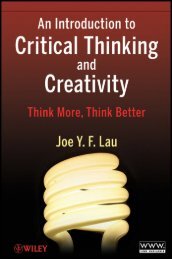- Page 4:
“ What always amazes me about Dav
- Page 8:
Brand Relevance
- Page 14:
Copyright © 2011 by John Wiley & S
- Page 20:
Contents Preface xiii 1. Winning th
- Page 24:
CONTENTS xi Does the Offering Have
- Page 28:
Preface During the last ten years,
- Page 32:
PREFACE xv There are dozens of othe
- Page 36:
You do not merely want to be consid
- Page 42:
2 BRAND RELEVANCE whereas the other
- Page 46:
4 BRAND RELEVANCE and being the num
- Page 50:
6 BRAND RELEVANCE Figure 1.2 The As
- Page 54:
8 BRAND RELEVANCE new tools, a new
- Page 58:
10 BRAND RELEVANCE The fi rst and m
- Page 62:
12 BRAND RELEVANCE There are a host
- Page 66:
14 BRAND RELEVANCE Figure 1.3 Brand
- Page 70:
16 BRAND RELEVANCE differentiation,
- Page 74:
18 BRAND RELEVANCE the competitor
- Page 78:
20 BRAND RELEVANCE the one UPS has
- Page 82:
22 BRAND RELEVANCE to some other st
- Page 86:
24 BRAND RELEVANCE A major risk is
- Page 90:
26 BRAND RELEVANCE The New Brand Ch
- Page 94:
28 BRAND RELEVANCE In the case of a
- Page 98:
30 BRAND RELEVANCE the brand role m
- Page 102:
32 BRAND RELEVANCE innovation. Or t
- Page 106:
34 BRAND RELEVANCE into a sustainab
- Page 110:
36 BRAND RELEVANCE newness (defi ne
- Page 114:
38 BRAND RELEVANCE A highly differe
- Page 118:
40 BRAND RELEVANCE champions of the
- Page 122:
42 BRAND RELEVANCE These works and
- Page 126:
44 BRAND RELEVANCE and transformati
- Page 132:
2 UNDERSTANDING BRAND RELEVANCE Cat
- Page 136:
UNDERSTANDING BRAND RELEVANCE 49 ch
- Page 140:
UNDERSTANDING BRAND RELEVANCE 51 ex
- Page 144:
UNDERSTANDING BRAND RELEVANCE 53 Th
- Page 148:
UNDERSTANDING BRAND RELEVANCE 55 Cu
- Page 152:
UNDERSTANDING BRAND RELEVANCE 57 Th
- Page 156:
UNDERSTANDING BRAND RELEVANCE 59 th
- Page 160:
UNDERSTANDING BRAND RELEVANCE 61 wa
- Page 164:
UNDERSTANDING BRAND RELEVANCE 63 Th
- Page 168:
UNDERSTANDING BRAND RELEVANCE 65 su
- Page 172:
UNDERSTANDING BRAND RELEVANCE 67 th
- Page 178:
70 BRAND RELEVANCE Retailers have s
- Page 182:
72 BRAND RELEVANCE but functional.
- Page 186:
74 BRAND RELEVANCE statement agains
- Page 190:
76 BRAND RELEVANCE business grows b
- Page 194:
78 BRAND RELEVANCE advantages. So h
- Page 198:
80 BRAND RELEVANCE would affect the
- Page 202:
82 BRAND RELEVANCE and related cont
- Page 206:
84 BRAND RELEVANCE go that involve
- Page 210:
86 BRAND RELEVANCE The Subway Story
- Page 214:
88 BRAND RELEVANCE The totality of
- Page 218:
90 BRAND RELEVANCE There were fi ft
- Page 222:
92 BRAND RELEVANCE hang from the ce
- Page 226:
94 BRAND RELEVANCE elusive synergy
- Page 232:
4 MARKET DYNAMICS IN THE AUTOMOBILE
- Page 236:
MARKET DYNAMICS IN THE AUTOMOBILE I
- Page 240:
MARKET DYNAMICS IN THE AUTOMOBILE I
- Page 244:
MARKET DYNAMICS IN THE AUTOMOBILE I
- Page 248:
MARKET DYNAMICS IN THE AUTOMOBILE I
- Page 252:
MARKET DYNAMICS IN THE AUTOMOBILE I
- Page 256:
MARKET DYNAMICS IN THE AUTOMOBILE I
- Page 260:
MARKET DYNAMICS IN THE AUTOMOBILE I
- Page 264:
MARKET DYNAMICS IN THE AUTOMOBILE I
- Page 268:
MARKET DYNAMICS IN THE AUTOMOBILE I
- Page 272:
MARKET DYNAMICS IN THE AUTOMOBILE I
- Page 276:
MARKET DYNAMICS IN THE AUTOMOBILE I
- Page 280:
MARKET DYNAMICS IN THE AUTOMOBILE I
- Page 284:
MARKET DYNAMICS IN THE AUTOMOBILE I
- Page 288:
MARKET DYNAMICS IN THE AUTOMOBILE I
- Page 292:
5 THE FOOD INDUSTRY ADAPTS It is us
- Page 296:
THE FOOD INDUSTRY ADAPTS 129 We sta
- Page 300:
THE FOOD INDUSTRY ADAPTS 131 Crete
- Page 304:
THE FOOD INDUSTRY ADAPTS 133 how to
- Page 308:
THE FOOD INDUSTRY ADAPTS 135 McDona
- Page 312:
THE FOOD INDUSTRY ADAPTS 137 found
- Page 316:
THE FOOD INDUSTRY ADAPTS 139 the po
- Page 320:
THE FOOD INDUSTRY ADAPTS 141 vigoro
- Page 324:
THE FOOD INDUSTRY ADAPTS 143 less r
- Page 328:
THE FOOD INDUSTRY ADAPTS 145 Mills
- Page 332:
THE FOOD INDUSTRY ADAPTS 147 • In
- Page 336:
THE FOOD INDUSTRY ADAPTS 149 have a
- Page 340:
THE FOOD INDUSTRY ADAPTS 151 of lig
- Page 344:
THE FOOD INDUSTRY ADAPTS 153 extra
- Page 348:
THE FOOD INDUSTRY ADAPTS 155 • An
- Page 354:
158 BRAND RELEVANCE It was a produc
- Page 358:
160 BRAND RELEVANCE silos confused
- Page 362:
162 BRAND RELEVANCE challenge the K
- Page 366:
164 BRAND RELEVANCE With that backg
- Page 370:
166 BRAND RELEVANCE Sometimes there
- Page 374:
168 BRAND RELEVANCE base was undoub
- Page 378:
170 BRAND RELEVANCE Figure 6.2 Find
- Page 382:
172 BRAND RELEVANCE service is gene
- Page 386:
174 BRAND RELEVANCE examined in slo
- Page 390:
176 BRAND RELEVANCE of ethnographic
- Page 394:
178 BRAND RELEVANCE sleepy brand in
- Page 398:
180 BRAND RELEVANCE product or serv
- Page 402:
182 BRAND RELEVANCE that decision,
- Page 406:
184 BRAND RELEVANCE Tata Chemicals,
- Page 410:
186 BRAND RELEVANCE • Nice ’ n
- Page 414:
188 BRAND RELEVANCE competitor was
- Page 418:
190 BRAND RELEVANCE Timing is parti
- Page 422:
192 BRAND RELEVANCE if any of these
- Page 426:
194 BRAND RELEVANCE Figure 6.3 Prio
- Page 432:
7 EVALUATION A great company is mor
- Page 436:
EVALUATION 199 Segway disliked the
- Page 440:
EVALUATION 201 potential to be game
- Page 444:
EVALUATION 203 of the many market f
- Page 448:
EVALUATION 205 buy products. She al
- Page 452:
EVALUATION 207 Predictions of a che
- Page 456:
EVALUATION 209 car or the failure t
- Page 460:
EVALUATION 211 middle - aged athlet
- Page 464:
EVALUATION 213 are not willing to s
- Page 468:
EVALUATION 215 values - driven moti
- Page 472:
EVALUATION 217 because fading busin
- Page 476:
EVALUATION 219 A key issue is often
- Page 480:
EVALUATION 221 Overcrowding is a re
- Page 484:
Barriers to Entry EVALUATION 223 A
- Page 488:
EVALUATION 225 For Discussion Pick
- Page 494:
228 BRAND RELEVANCE referred to as
- Page 498:
230 BRAND RELEVANCE uptime statisti
- Page 502:
232 BRAND RELEVANCE Figure 8.1 Sale
- Page 506:
234 BRAND RELEVANCE events ” ever
- Page 510:
236 BRAND RELEVANCE • Best Buy
- Page 514:
238 BRAND RELEVANCE Figure 8.2 Defi
- Page 518:
240 BRAND RELEVANCE passengers more
- Page 522:
242 BRAND RELEVANCE Multiple benefi
- Page 526:
244 BRAND RELEVANCE affordable Targ
- Page 530:
246 BRAND RELEVANCE A retailer norm
- Page 534:
248 BRAND RELEVANCE best, you will
- Page 538:
250 BRAND RELEVANCE established fi
- Page 542:
252 BRAND RELEVANCE new generation
- Page 546:
254 BRAND RELEVANCE landfi lls each
- Page 550:
256 BRAND RELEVANCE bureaucracy, in
- Page 554:
258 BRAND RELEVANCE Organizational
- Page 558:
260 BRAND RELEVANCE opinions, but t
- Page 562:
262 BRAND RELEVANCE Become the Exem
- Page 566:
264 BRAND RELEVANCE One way to get
- Page 570:
266 BRAND RELEVANCE The challenge i
- Page 576:
9 CREATING BARRIERS Sustaining the
- Page 580:
CREATING BARRIERS 271 can have the
- Page 584:
Figure 9.1 Yamaha Disklavier CREATI
- Page 588:
CREATING BARRIERS 275 line; effi ci
- Page 592:
CREATING BARRIERS 277 barrier can b
- Page 596:
CREATING BARRIERS 279 accumulates e
- Page 600:
CREATING BARRIERS 281 If a master b
- Page 604:
CREATING BARRIERS 283 the one that
- Page 608:
CREATING BARRIERS 285 cared more ab
- Page 612:
CREATING BARRIERS 287 either copy i
- Page 616:
CREATING BARRIERS 289 satisfaction;
- Page 620:
CREATING BARRIERS 291 If the brand
- Page 624:
CREATING BARRIERS 293 If a brand la
- Page 628:
CREATING BARRIERS 295 In some cases
- Page 632:
10 GAINING AND MAINTAINING RELEVANC
- Page 636:
GAINING AND MAINTAINING RELEVANCE 2
- Page 640:
GAINING AND MAINTAINING RELEVANCE 3
- Page 644:
GAINING AND MAINTAINING RELEVANCE 3
- Page 648:
Stick to Your Knitting GAINING AND
- Page 652:
GAINING AND MAINTAINING RELEVANCE 3
- Page 656:
GAINING AND MAINTAINING RELEVANCE 3
- Page 660:
GAINING AND MAINTAINING RELEVANCE 3
- Page 664:
GAINING AND MAINTAINING RELEVANCE 3
- Page 668:
GAINING AND MAINTAINING RELEVANCE 3
- Page 672:
GAINING AND MAINTAINING RELEVANCE 3
- Page 676:
GAINING AND MAINTAINING RELEVANCE 3
- Page 680: GAINING AND MAINTAINING RELEVANCE 3
- Page 684: GAINING AND MAINTAINING RELEVANCE 3
- Page 688: GAINING AND MAINTAINING RELEVANCE 3
- Page 694: 328 BRAND RELEVANCE through acquisi
- Page 698: 330 BRAND RELEVANCE The innovation
- Page 702: 332 BRAND RELEVANCE it packages and
- Page 706: 334 BRAND RELEVANCE What follows is
- Page 710: 336 BRAND RELEVANCE systems need to
- Page 714: 338 BRAND RELEVANCE unmet needs. Th
- Page 718: 340 BRAND RELEVANCE or subcategory,
- Page 722: 342 BRAND RELEVANCE Introducing the
- Page 726: 344 BRAND RELEVANCE commitment may
- Page 732: THE INNOVATIVE ORGANIZATION 347 com
- Page 736: THE INNOVATIVE ORGANIZATION 349 exi
- Page 740: THE INNOVATIVE ORGANIZATION 351 imp
- Page 744: THE INNOVATIVE ORGANIZATION 353 3.
- Page 750: 356 EPILOGUE It is true that avoidi
- Page 756: Notes Chapter One 1. From a talk gi
- Page 760: NOTES 361 Across - Category Conside
- Page 764: NOTES 363 3. “ Lexus 400, ” Toy
- Page 768: NOTES 365 5. Tom Kelly, The Art of
- Page 772: NOTES 367 18. Andrew S. Grove, Keyn
- Page 776: NOTES 369 8. Pallavi Gogoi and Mich
- Page 780:
INDEX A A.1. steak sauce, 28 Aaker,
- Page 784:
INDEX 373 Chux, 32-33 Circuit City,
- Page 788:
INDEX 375 work” concept, 330; Ima
- Page 792:
INDEX 377 Magee, D., 327, 329 Marig
- Page 796:
INDEX 379 Rakuten, 70-71 Ralph Laur
- Page 800:
INDEX 381 offerings, 124, 155; over

















